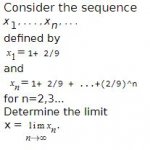I have the following problem:
Consider the sequence, \(\displaystyle x_1,\, x_2,\, ...,\, x_n,\, ...,\) defined by:
. . . . .\(\displaystyle x_1\, =\, 1\, +\, \dfrac{2}{9}\)
and
. . . . .\(\displaystyle x_n\, =\, 1\, +\, \dfrac{2}{9}\, +\, ...\, +\, \left(\dfrac{2}{9}\right)^n\)
for \(\displaystyle n\, =\, 2,\, 3\, ...\)
Determine the limit:
. . . . .\(\displaystyle \displaystyle x\, =\, \lim_{n \rightarrow \infty}\, x_n\)
I have tried to solve this problem but without luck. How do I proceed?
Consider the sequence, \(\displaystyle x_1,\, x_2,\, ...,\, x_n,\, ...,\) defined by:
. . . . .\(\displaystyle x_1\, =\, 1\, +\, \dfrac{2}{9}\)
and
. . . . .\(\displaystyle x_n\, =\, 1\, +\, \dfrac{2}{9}\, +\, ...\, +\, \left(\dfrac{2}{9}\right)^n\)
for \(\displaystyle n\, =\, 2,\, 3\, ...\)
Determine the limit:
. . . . .\(\displaystyle \displaystyle x\, =\, \lim_{n \rightarrow \infty}\, x_n\)
I have tried to solve this problem but without luck. How do I proceed?
Attachments
Last edited by a moderator:

